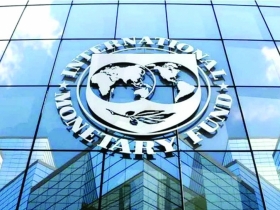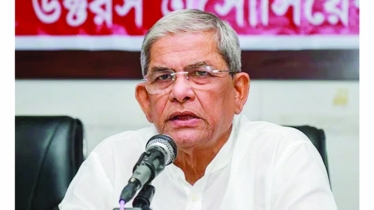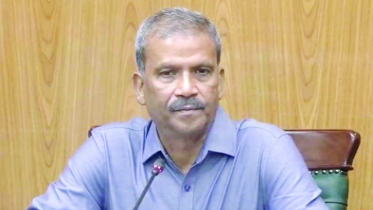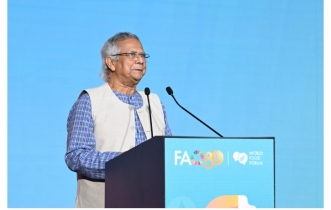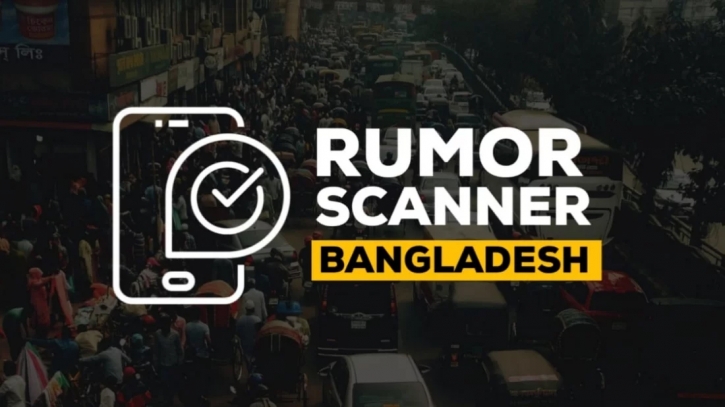
Rumor Scanner, a fact-checking organization in Bangladesh, identified 296 instances of misinformation circulating on the internet in April this year.
In addition to regular fact-checks, Rumor Scanner published a “Fact File” about old rumors involving Professor Dr Muhammad Yunus that resurfaced during the genocide in Gaza.
The Rumor Scanner Investigation Unit also released an investigative report from their team about a new method of spreading political misinformation using Blogspot’s free domain.
In the previous month March, 298 false claims were identified.
Based on fact-checks published on Rumor Scanner’s website in April, most misinformation (101 items) was related to national issues, making up 34% of the total.
There were also 95 political, 38 international, 27 religious, 8 entertainment and literary, 7 education-related, 10 fraud-related, and 9 sports-related false claims found during the month.
Most of the misinformation identified last month was based on text, with 138 cases. There were also 105 cases based on videos and 53 based on images.
Among all the identified misinformation, 180 were labeled as false, 66 as misleading, and 48 as distorted.
Additionally, two sarcastic or humorous posts were fact-checked because they were being shared as if they were real.
Facebook released the highest number of misinformation cases last month, with 276 instances.
YouTube followed FB with 54, Instagram with 48, X (formerly Twitter) with 44, TikTok with 24, and Threads with 13 false claims.
Rumor Scanner also found misinformation published by multiple national media outlets in 14 different incidents.
Since last year, the spread of misinformation about Bangladesh by Indian media outlets and social media accounts has been on the rise. This trend continued in April, as observed by Rumor Scanner.
Last month, two incidents of misinformation involving Bangladesh were reported in Indian media.
Additionally, two more instances were identified where Indian social media accounts and pages disseminated misinformation about Bangladesh.
In April, Rumor Scanner detected about 16 misinformation on communal issues. Analysis revealed that 12 misinformation in April targeted the current interim government of Bangladesh.
To understand the nature of these false claims, they were categorized into two groups: those portraying the government positively and those portraying it negatively.
The findings indicated that approximately 83% of these misinformation cases presented the government negatively.
In April, Dr Muhammad Yunus, the chief adviser of Bangladesh’s interim government, was targeted in 29 instances of misinformation- the highest monthly number so far this year. Nearly 83% of these misleading claims portrayed him in a negative light.
Alongside Dr Yunus, other advisers were also subjects of misinformation. Dr Asif Nazrul was linked to three such incidents, all of which were negative.
Asif Mahmud Shojib Bhuyain was involved in two cases, half of which were unfavorable. Two false claims were made about Syeda Rizwana Hasan, both negative.
Additionally, AFM Khalid Hossain, Sk Bashiruddin, and the Chief Adviser’s Press Secretary Shafiqul Alam were each linked to one piece of misinformation, all presenting them negatively.
In April, Rumor Scanner identified a significant number of disinformation cases targeting political parties and figures in Bangladesh.
The Bangladesh Nationalist Party (BNP) was the most affected, with 13 instances of disinformation, all portraying the party negatively.
BNP Chairperson Khaleda Zia was the subject of one negative claim, Acting Chairman Tarique Rahman was involved in two cases (one negative), and Secretary General Mirza Fakhrul Islam Alamgir faced nine instances, all unfavorable.
Additionally, the party’s student wing, Bangladesh Jatiotabadi Chhatra Dal, was linked to two negative disinformation cases, and the youth wing, Jubo Dal, was associated with one.
Bangladesh Jamaat-e-Islami was also targeted, with six misinformation cases, all casting the party in a negative light.
The party’s Ameer Dr Shafiqur Rahman was involved in two negative instances, and its student wing, Bangladesh Islami Chhatra Shibir, was linked to six cases, all unfavorable.
In April, Rumor Scanner identified eight instances of disinformation involving the Bangladesh Awami League, with 75% of these portraying the party in a favorable light.
The party’s student wing, Bangladesh Chhatra League, was associated with one negative disinformation case, while its youth wing, Jubo League, was linked to three cases, two-thirds of which were favorable.
Awami League President Sheikh Hasina was the subject of six disinformation cases during this period, with approximately 83% casting her in a positive light.
The newly formed National Citizen Party (NCP), established in February 2025, was targeted in three disinformation cases in April, all of which were negative.
The party’s Convener Nahid Islam was involved in two negative cases.
Other NCP leaders, including Hasnat Abdullah (three cases), Sarjis Alam (two cases), and Nusrat Tabassum (one case), were also subjects of disinformation, all portraying them unfavorably.
The state security forces were not spared from the wrath of misinformation either. Last month, Rumor Scanner identified 16 instances of misinformation involving the Bangladesh Army, including six cases related to the Army’s Chief General Waker-uz-Zaman.
Additionally, nine cases of misinformation involving the Bangladesh Police were also detected.
During the period of the quota movement and the subsequent Awami government collapse, the organization “Anti-Discrimination Student Movement” fell victim of two misinformation in March.
Furthermore, Rumor Scanner observed one case of misinformation involving the spokesperson of the organization, Umama Fatema.
After analyzing the misinformation from last month, Rumor Scanner found 19 instances of fake content created using artificial intelligence. In the same period, three deepfake videos were identified.
In April, there was a global wave of protests against the ongoing genocide and ethnic cleansing in Gaza, Palestine.
A platform called “Palestine Solidarity Movement Bangladesh” organized a “March for Gaza” event in Dhaka on April 12.
In connection with these events, Rumor Scanner identified at least 38 pieces of misinformation related to these incidents.
Additionally, 11 pieces of misinformation were identified regarding an attack on tourists in Kashmir last month.
In addition, five instances of misinformation were identified regarding the Sunni congregation held in Dhaka on April 26.
Last month, 62 instances of misinformation were spread involving 25 domestic and foreign news outlets, using fake media names, logos, headlines, and counterfeit photo cards.
Among the mainstream media Jamuna TV had the most (12 instances) misused in spreading misinformation. After Jamuna TV, the names of Prothom Alo and Janakantha were most frequently used (8 times each) in spreading misinformation.

